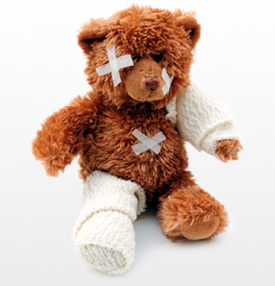Old Injuries Do Not Go Away
Working to diagnose current injuries is often about uncovering old injuries that led to the immediate issue.
And it is amazing how often a present situation directly relates to a forgotten injury or accident.
Sometimes injuries are forgotten about because they are dismissed as inconsequential or sometimes we simply forget.
Many times clients don’t remember an injury from childhood, or recognize its significance, until working together for more than a year.
“You know, my mother reminded me of a car accident when I was three that hurt my shoulder.”
Some injuries are acute and obvious— fall down the stairs and break an ankle and you have something very concrete to heal.
But how you heal is the key.
It is totally normal to turn out your foot and limp your way to healing a sprained ankle.
But what happens after the healing? Did you return to your original walking patterns?
Or did you take on some of the compensation creating a new walk?
It requires a certain amount of detective work to uncover many of these connections.
And then it is often a years-long process to unwind the negative patterns associated with healing a prior injury.
This is the reality that I work with day after day, which I admit to finding exciting.
I never truly know what each client brings to the room. And I relish the chance to help people figure out complex pain issues.
Particularly issues that multiple doctors and physical therapists have failed to figure out.
The actions and accidents of life stick around and change who we are and how we move throughout our lifetime.
It can be easy to simply accept this as who we are and part of the process.
And while this is true, we are also highly adaptable. It is never too late to do the work to uncover patterns that serve us better.
While we are highly adaptable we don’t always make a distinction between good and bad changes.
Add to this the maddening fact that we aren’t really designed to think about the way we stand and move.
We stand and walk. It’s what we do.
But I wish I could tell you that because you walk, you walk well. It doesn’t work that way.
So we reach adulthood and walk in a way that was often built on compensations for injury.
And then we wonder why it isn’t as easy to get out of chronic pain as we had hoped.
But hope is not lost. If you pay attention to the way you move and develop new movement patterns, you can rebuild your body so it works well for years into the future.

